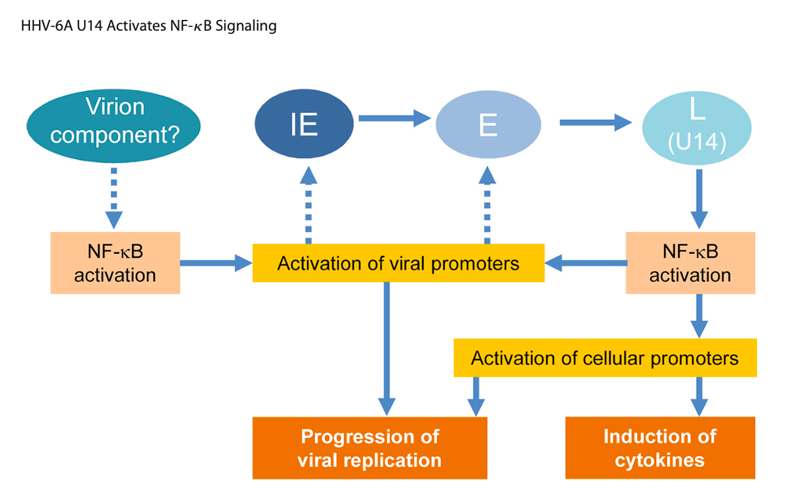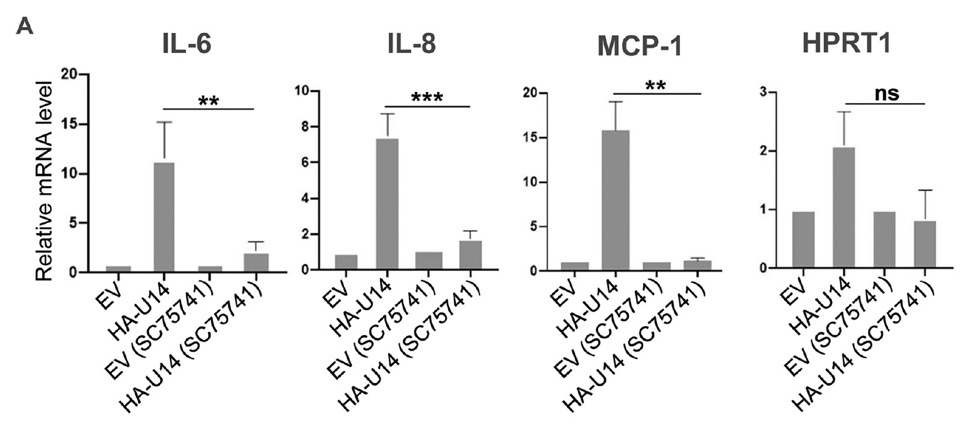The late protein U14 of HHV-6A can induce the pro-inflammatory transcription factor NFκB, and NFκB, in turn, can encourage the replication of HHV-6A.
The pro-inflammatory transcription factor, NFκB, plays a central role in antiviral responses, and in several diseases characterized by inflammation. NFκB also plays an important role in apoptosis and cell proliferation. HHV-6A has been associated with several of these diseases, although an etiologic role remains uncertain.
 A team led by Professor Yasuko Mori, of Kobe University Graduate School of Medicine, has identified a late protein of HHV-6A, U14, that activates NFκB. U14 is a tegument protein shown by prior work to be essential for viral replication. U14 induces cell cycle arrest in G2/M phase.
A team led by Professor Yasuko Mori, of Kobe University Graduate School of Medicine, has identified a late protein of HHV-6A, U14, that activates NFκB. U14 is a tegument protein shown by prior work to be essential for viral replication. U14 induces cell cycle arrest in G2/M phase.
The new study from the Kobe team demonstrates that, following infection, U14 induces the NFκB complex protein, p65, to translocate to the nucleus. This translocation then induces the expression of interleukin-6 (IL-6), IL8 and monocyte chemoattractant protein 1, all NFκB-dependent cytokines. This cytokine expression was blocked by two molecules that block NFκB, confirming that the increase cytokine expression following HHV-6 infection is mediated by NFκB (see Figure).

Figure 1. Levels of mRNAs for three NFκB-dependent cytokines—IL-6, IL-8, MCP-1—and one cytokine not dependent on NFκB following: transfection of HEK293T cells with empty plasmid (EV); with the HA-U14 expression plasmid; with EV and an NFκB blocker (SC75741); and with the HA-U14 expression plasmid and the NFκB blocker. Similar results were seen with a second NFκB blocker.
Similar results were noted when JJhan cells were mock infected or infected with HHV-6A (strain U1102).
Finally, the investigators infected JJhan cells with HHV-6A in the presence or absence of an NFκB blocker. Expression of the HHV-6A immediate early protein, IE2, and late proteins U14 and gQ1 occurred in the absence of the NFκB blocker, but not in its presence. Thus, expression of NFκB enhances the replication of HHV-6A.
In conclusion, a potential vicious cycle occurs when HHV-6A late protein generates NFκB-dependent cytokine production, which then encourages the replication of HHV-6A. This vicious cycle could plausibly play an important role in the genesis of smoldering pro-inflammatory disease processes.
Read the full article: Aktar 2021

